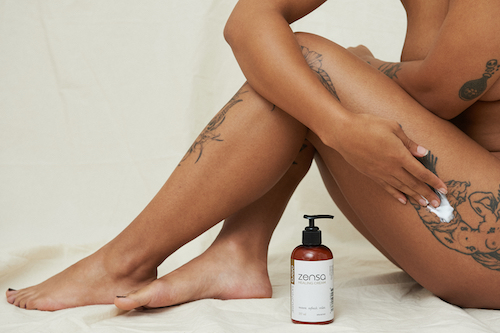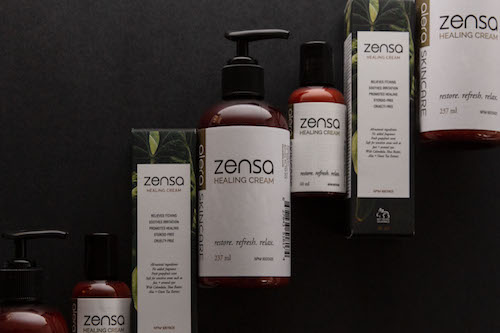How To Keep Your Skin Hydrated (& Relieve Dry, Itchy Skin)
How To Keep Your Skin Hydrated (& Relieve Dry, Itchy Skin)
You know hydration is important – for your body, mind and healthy, glowing skin. A smooth complexion not only gives you a confidence boost but is a sign of a strong skin barrier, which is essential to your overall skin health. Some benefits of a strong skin barrier are protecting against inflammation, infection, sun damage, reduced elasticity, cracking, bleeding or flaky, scaly skin patches. Hydrated skin looks younger, even-toned and leaves you with a generally clearer complexion. A well-nourished skin barrier leaves you with fewer wrinkles and fine lines, acne, hyperpigmentation or dry patches (and protects against future skin issues).
The more scientific name for the skin barrier is the stratum corneum, the outermost layer of the epidermis. It acts as a buffer between the outside world and deeper skin layers – the dermis (middle layer, which keeps the skin resilient and flexible) and hypodermis (bottom layer, which acts as a shock absorber to protect against injuries). Your skin barrier, or stratum corneum, has two main functions: to lock moisture in and keep microbes, pollutants and other damaging elements out. It blocks transepidermal water loss and shields against potential irritations. Both of these functions are essential to prevent a damaged skin barrier – the main culprit of inflammatory conditions like eczema, psoriasis and rosacea, and generally dry, itchy skin.
Read on to discover some of the most important healthy habits and skincare ingredients to incorporate into your routine for more hydration and dry, itchy skin relief.
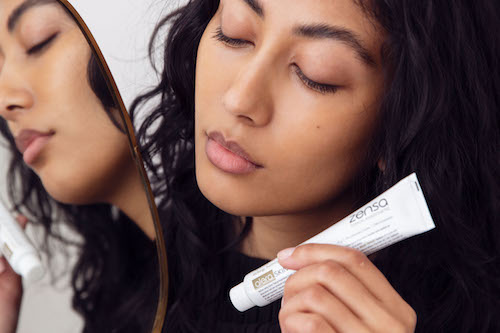
Look Inward
There’s a reason we say that someone’s skin looks a little parched. Drinking (and eating) enough water is essential for hydrated skin. Get in at least 8 glasses of water and plenty of high-water produce every day for optimal skin benefits. Alongside countless other health benefits, a water-rich diet might be as hydrating as a topical moisturizer for your skin. A 2015 study found that consuming more H2O and hydrating foods (fruit, vegetables, soups) had similar skin hydration benefits to standard lotion application for individuals with dry skin.
While drinking water doesn’t replace a step in your skincare routine, use having radiant skin as a motivator to get up for a glass of water or reach for a bowl of nutrient-rich melon for dessert.

Credit: Mujer de 10/Pinterest
Be Mindful of Your Surroundings
Dry, brisk air is a recipe for dehydrated skin. Once winter arrives, it seems nearly inevitable that you’ll be looking for ways to hydrate your seasonally dry complexion. Even if you’ve been drinking your water and slathering on lotion, there are a lot of environmental factors that make it difficult to find relief for your dry, itchy skin. Higher humidity levels make it easier for our skin to stay hydrated. Our skin barrier’s natural oils trap humidity from the air to retain moisture. In the winter, humidity levels decrease all around. Outdoor humidity levels become lower, and the colder temperatures force you inside. Indoor heaters decrease the humidity in the space. Without this consistent moisture, your skin gets dried out and stripped of its natural oils. This environment weakens the skin barrier – leading to dry skin.
Use a humidifier to increase the moisture in your home or office area. Set your humidifier to around 30%-50% humidity to help replenish your skin. Take shorter showers and limit your hot water use (when washing your body or hands). Apply moisturizer immediately after a shower or hand washing to avoid further stripping the skin of its natural oils.
Increase Your Vitamin D Intake
Consuming enough Vitamin D is key to maintaining a strong skin barrier and hydrated skin. Spending less time outdoors – especially in the winter – makes it more difficult to get enough vitamin D, which contains natural anti-inflammatory properties. Sunlight is often our greatest (and preferred) source of Vitamin D. A vitamin D deficiency lowers our immune response and raises our skin’s inflammatory markers. There's considerable evidence correlating adequate vitamin D levels (from the sun or supplements) with reduced eczema (atopic dermatitis) symptoms. A 2020 study found that vitamin D supplements lessened severe atopic dermatitis (AD) symptoms in children.
Whether you’re seeking to combat dry, itchy winter skin or an eczema flare-up, spend at least 10-15 minutes outside during daylight hours or ingesting concentrated forms of vitamin D. Consider taking a daily vitamin D supplement and incorporating vitamin D-rich foods, such as fortified non-dairy milks and cereals, mushrooms into a plant-based diet or salmon, canned tuna and egg yolks into a non-vegetarian diet.
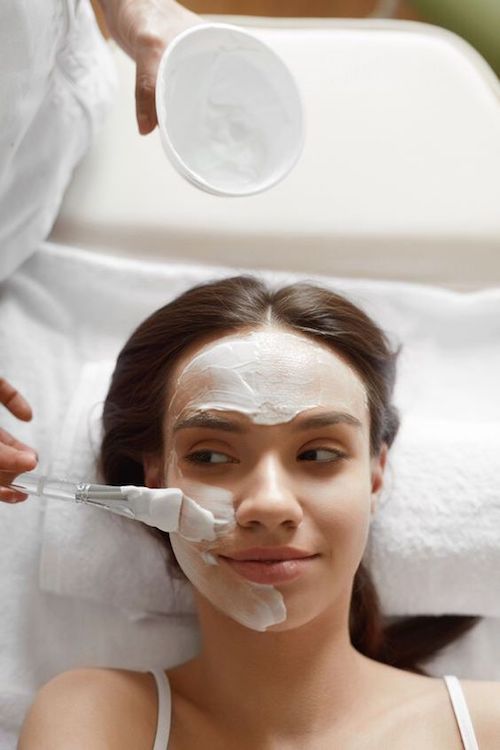
Credit: Joanna Vargas/Pinterest
Don’t Over Exfoliate
While the practice offers many benefits, exfoliating too much worsens your dry, itchy skin. Limit exfoliation to 1-2 times per week. This routine allows you to reap the benefits of exfoliation, like boosting collagen and removing dehydrating, dead skin cells without stripping the natural oils and moisture from your skin. Some signs of over-exfoliating include redness, irritation, inflammation, burning, peeling and minor breakouts – all of which indicate a damaged skin barrier. If your skin develops a tight, waxy texture, you’re probably over-exfoliating. While your skin may have a temporary glow, you’re actually exposing premature, dry and highly sensitive skin.
Remove any retinol, facial acids and physical or chemical exfoliators if you’re experiencing any of these symptoms. Replace them with a mild cleanser and a fragrance-free moisturizer. Once your skin heals and returns to its “baseline” texture, consider dry brushing or using a homemade sugar scrub to exfoliate the skin. Products containing glycolic acid and lactic acid also are great exfoliators for dry skin.

Go Back To The Skincare Basics
To heal dehydrated skin, keep your skincare as simple and nourishing as possible. Choose fragrance-free products, including a gentle cleanser, moisturizer and serums. Add a weekly moisturizing face (or body) mask into your routine to boost skin hydration. If you have particularly depleted skin, consider adding slugging into your nightly skincare regimen. Slugging is a highly moisturizing technique that involves coating your entire face in a thin layer of petroleum jelly (Vaseline) after completing your normal skincare routine. Let the balm soak into your skin overnight before washing it off the next morning. This practice is recommended for ultra-thirsty, dry skin – especially during the cold winter months.
Petroleum jelly is an occlusive moisturizer, which acts as a temporary second skin barrier. It seals in moisture and prevents trans-epidermal water loss. Petroleum jelly is scientifically-proven to reduce nearly 99% of trans-epidermal water loss. This powerful benefit helps maximize the effectiveness of hydrating skincare products used underneath and accelerate your journey to achieve more hydrated skin.
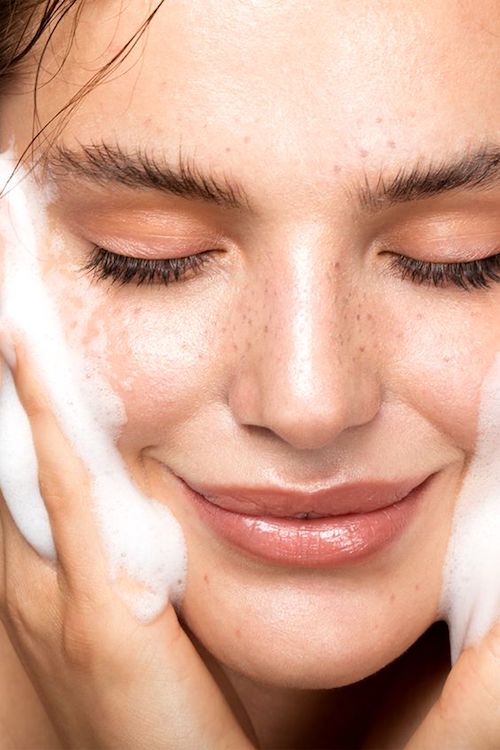
Credit: Glomance/Pinterest
Choose Ingredients Wisely
Hydrating ingredients are humectants, meaning that they draw water to the skin. Humectants differ from moisturizing ingredients, like occlusives or emollients, which lock in moisture and prevent water loss. For oily skin types, humectant skincare products keep the skin hydrated and, unlike occlusives, won’t lead to breakouts caused by clogged pores. However, in dry climates or during the winter, make sure to pair these hydrating ingredients with a moisturizer to ensure that they draw water from the deeper layers of your skin. Dry skin will benefit from layering hydrating humectants with emollients or occlusives to moisturize and heal your damaged skin barrier, leaving you with healthy, hydrated skin.
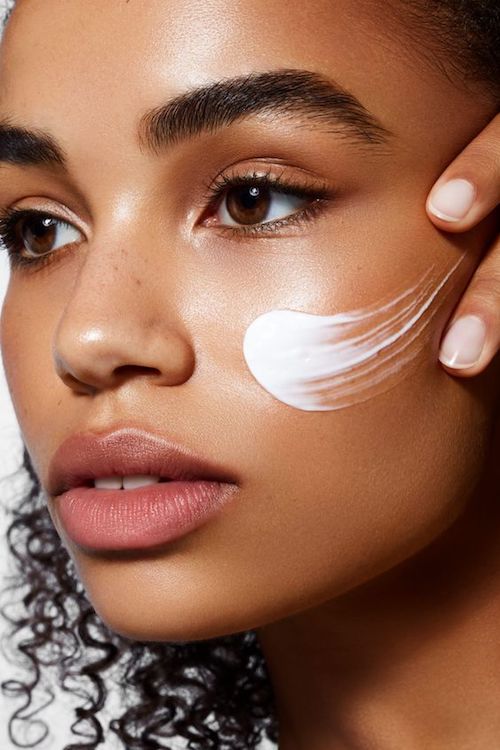
Credit: Natascha Lindemann/Pinterest
Look for ingredients, such as hyaluronic acid, aloe vera, glycerin, shea butter, ceramides and lactic acid. They are effective as the main ingredients in your skincare products or for use in their pure form to relieve dry, itchy skin.
Best Ingredients To Hydrate Skin
Hyaluronic acid is a sugar molecule that can hold up to 1,000 times its weight in water. A 2014 study found that hyaluronic acid increased skin hydration by 96% when applied topically after 8 weeks. Hyaluronic acid stimulates collagen production to accelerate cellular turnover, remove dehydrating, dead skin cells and strengthen the skin barrier. Some other benefits of hyaluronic acid for your skin include improving dryness, itchiness and skin elasticity.
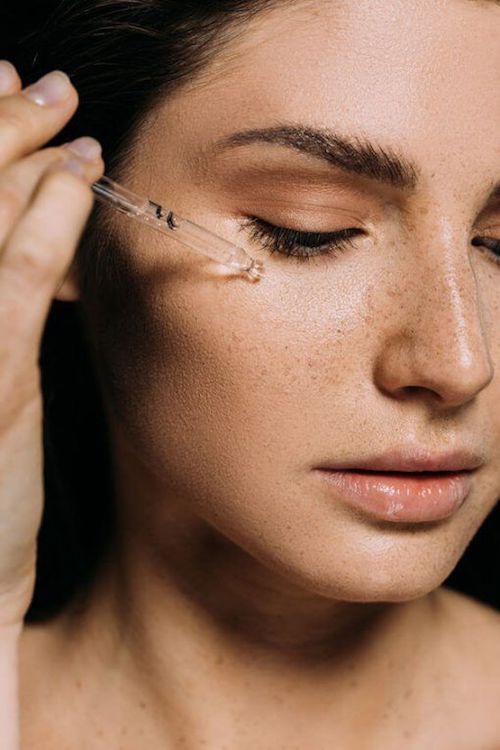
Credit: Beverly Hills MD/Pinterest
In its pure gel form, aloe vera is made up of 99% water. Like hyaluronic acid, aloe vera is a humectant that instantly absorbs and hydrates the skin. The gel is rich in vitamins A, C, E, B12 and over 75 elements, including antioxidants, enzymes, amino acids and minerals. Aloe vera is an effective moisturizer for all skin types that nourishes flaky, inflamed patches and calms dry, itchy skin.
Glycerin is a non-toxic compound derived from vegetable oils and is among the most common humectants in skincare products. It is known for its hydration and skin barrier repairing properties. A 2002 study found glycerin to be an effective treatment for eczema symptoms and management.

Ceramides are long-chain lipids found in the epidermis that work with other fatty acids to maintain the skin barrier and prevent moisture loss. Like with collagen and hyaluronic acid, your skin’s natural ceramide production slows down as you age. A 2018 study concluded that ceramide creams help improve skin barrier function and increase skin hydration. Ceramides are a great skincare option for individuals with dry skin or eczema (an inflammatory condition caused by skin barrier dysfunction that leads to fewer ceramides present in the skin).
Lactic acid is an alpha hydroxy acid (AHA), known for its exfoliation and hydration benefits. It is one of the more gentle hydroxy acids that remove old, dehydrating skin cells and improve the skin’s natural moisture levels. Lactic acid stimulates collagen production to fade wrinkles, hyperpigmentation and revitalize dry skin.
Shea butter is a lipid, derived from African shea tree nuts. It is rich in antioxidants and essential fatty acids, including vitamins A, D, E, F and stearic and oleic acids. Shea butter offers ample hydration and skin-calming benefits. It is a common ingredient in moisturizers that hydrates and softens your complexion. Shea butter works great for dry skin and helps soothe irritation. The plant lipid also reduces hyperpigmentation to help fade scars and sunspots.
Zensa Healing Cream combines medicinal ingredients, calendula oil and grapefruit seed oil, with the skin hydration benefits of shea butter with cucumber extract, hyaluronic acid, aloe vera and glycerin. These natural, vegan and cruelty-free elements work together to repair a damaged skin barrier for resilient, restored and hydrated skin. Zensa Healing Cream is designed to aid in the tattoo healing process, permanent makeup and cosmetic treatment after-care, and soothe dry skin, eczema and other similar inflammatory skin conditions.
For more natural remedies for dry skin, read about these 10 hydrating herbs for glowing skin.

